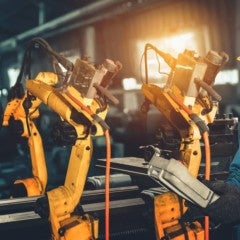Greater Houston boasts vast potential to capitalize on the nascent AI boom, but it lags behind other large metro areas in AI innovation, talent and startups, according to a new analysis from researchers at Brookings Metro.
The findings arrive as more states, local governments and schools develop strategies for pioneering the expected AI revolution. At stake: high-paying jobs and economic growth that could propel Houston for decades.
To evaluate regions and their AI readiness, researchers at Brookings Metro — an arm of the nonpartisan Washington, D.C., think tank Brookings Institution — analyzed data taken from the U.S. Census, OpenAI, Pitchbook, Lightcast and several other sources.
They labeled Houston as one of 28 “star hubs,” their second-highest ranking, for AI readiness. (Only two regions, the San Francisco Bay and San Jose areas, earned top billing as “superstars.”)
But Houston, the nation’s fifth-largest metropolitan statistical area, ultimately ranked 16th in the analysis, trailing areas like Austin, Atlanta, Dallas and Chicago.
“Houston seems to have a quite strong starting point, but with some clear need to ramp up the academic work and innovation side, and I think bolster the entrepreneurial and startup world around this,” said Brookings Metro Senior Fellow Mark Muro, who co-authored the report.
Here’s where Houston is succeeding and struggling in the early days of the AI economy — and how it might better compete.
Strong readiness for AI
Houston earned high marks for the share of companies ready to reap the benefits of AI, owing in part to its energy, health care and aerospace engineering industries.
A relatively large percentage of Houston firms have adopted cloud-based computing technology, prepared digital files for AI use and exposed their employees to generative AI, researchers found.
“This fits very much with Houston’s standing as a large business center with activity in a lot of white-collar, high-end health, energy and even academic activities,” Muro said.
A modest labor and talent pool
While Houston’s top industries might be ready to harness the power of AI, some local employers aren’t converting that potential into jobs just yet.
Among the 10 largest U.S. metro areas, Houston had the third-fewest job postings requiring AI skills relative to the working population size, according to Brookings Metro’s analysis of data from Lightcast, a labor market intelligence company.
Houston also had the second-lowest rate of employees with AI skills listed in online job profiles in 2024, a measure of the local talent pool, though it saw strong gains over the past several years, according to the Lightcast data.
Many of Greater Houston’s leading higher education institutions — including Rice University — have launched or will soon start AI programs for college students, while some school districts are dipping their toes into AI education.
But Houston still has “a long way to go” toward cultivating AI talent, said Sanjoy Paul, executive director of the startup incubator Rice Nexus and co-founder of Houston AI, a nonprofit fostering regional AI initiatives.
“Don’t get me wrong, there are people who are tech-savvy, but they’re in pockets,” Paul said. “If we want the economic benefit to go to the masses, then the training you need is different.”
Short on startup investment, innovation
Houston’s famous entrepreneurial spirit hasn’t fully translated yet to AI.
The region received relatively low marks from Brookings Metro for the number of startups and venture capital deals related to AI-driven products. Local researchers also published few papers at top AI conferences and innovators secured a modest number of AI patents.
In turn, the federal government has awarded few AI research and development contracts to Houston companies, largely relying instead on coastal tech hubs.
Paul said Houston’s startup culture around AI is “getting better and better,” but the region is “definitely not on par with Silicon Valley or the East Coast yet.”
A more coordinated approach?
Brookings Metro researchers found several metro areas are readying for the AI economy with strong regional collaborations between leaders in government, industry and academic institutions.
In New Jersey, the NJ AI Hub aims to foster innovation and economic development behind four founding partners — Princeton University, the state’s economic development agency, Microsoft and AI cloud company CoreWeave — and more than $70 million in pledged support.
The Mississippi Artificial Intelligence Network, spearheaded by the state’s colleges and universities, has partnered with state government and local businesses to prioritize workforce development. The alliance has produced AI curricula available statewide, while about 3,000 K-12 educators have taken an online Intro to AI course.
Various organizations and institutions have AI-centered initiatives, including the Rice AI Venture Accelerator, but the region lacks a unifying strategy.
Paul said he’s seen strong community interest in better regional collaboration through his work on Houston AI, which has held events, made presentations and met with community leaders over the past several months. Still, he called on city leaders to take a bigger role in organizing Houston for the AI future.
“We, as a nonprofit, can only do so much,” Paul said. “The city plays an active role. Bring in the most influential people, then other people will get attracted.”



